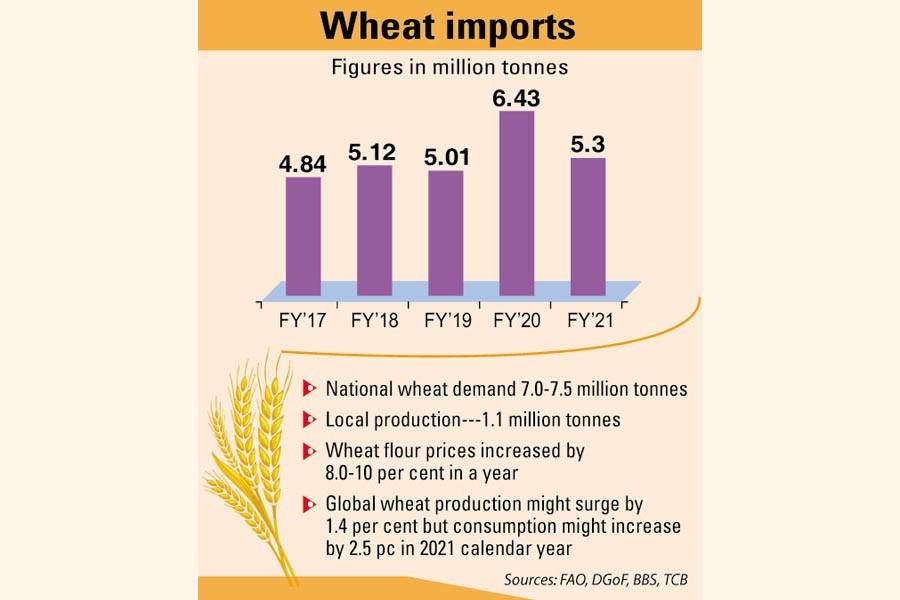Import of wheat, the second most important staple food crop in Bangladesh after rice, has declined notably by more than 1.13 million tonnes or 18 per cent in the just ended financial year (FY 21), compared to FY 20.
Rising costs of the grain in the global market as well as some risk factors related to imports caused the plunge during this pandemic when demand has increased in real terms, said traders.
Meanwhile, low imports and considerably tiny local production have caused a price surge of wheat flour and baked items in the country significantly, adding to woes of commoners already hit hard by the Covid-19 pandemic, said insiders.
The private sector and the government combined imported nearly 5.30 million tonnes of wheat last FY, while the import volume hit an all-time high of 6.43 million tonnes in FY 20, according to the Directorate General of Food.
Meanwhile, imports of wheat through the public sector increased by 66 per cent to 0.5 million tonnes in FY 21, whereas the private sector's wheat import declined by 27 per cent to 4.8 million tonnes during the same period, said the food directorate.
However, prices of wheat flour increased by 8.0-10 per cent in city retail shops in the last six months.
Prices of branded maida (finer wheat flour) have increased to Tk 48-51 per kg in June from Tk 43-45 a kg in December 2020, according to trading sources.
Meanwhile, the price of loose maida has also increased to Tk 40-43 a kg from Tk 35-38 a kg.
Price of loose aata (coarse flour) increased to Tk 32-35 a kg from Tk 30-31 a kg in the city retail markets.
Packet aata prices also increased to Tk 40-41 a kg from Tk 36-38 a kg six months back.
Director of City Group, mother concern of Teer brand, Biswajit Saha said millers had squeezed imports amid a notable surge in global prices.
He said wheat prices had been rising for the last one year.
Russian and North American wheat prices rose to US$340-400 a tonne in recent times, he said.
Fear of any massive decline in prices forced millers to import the item 'conservatively' to avoid losses, explained Mr Saha.
However, the National Board of Revenue (NBR) had removed the 5.0 per cent advance income tax (AIT) on imported wheat in December 2020.
But such a facility also failed to encourage the local importers to bring in the item in large volumes, said insiders.
The global trade web-portal Index Mundi data also showed that prices of wheat increased by 20-25 per cent in the last six months (January to June).
Average global prices crossed $290 a tonne in recent months, according to the portal.
Consumers Association of Bangladesh (CAB) secretary Humayun Kabir Bhuiyan said a shift in consumers' diet preference and flourishing baked food market had increased the demand for wheat in the last one decade.
He said apart from rice, the government should also raise wheat imports.
He said wheat flour is consumed by low-income people in large volumes.
Even two meals a day are now prepared with items made of wheat flour, he said.
He said the surge in wheat prices would directly affect the common people, who are already hit hard by skyrocketing prices of daily essentials amid a decline in income due to the pandemic.
However, the government has a stock of 0.3 million tonnes of wheat in public warehouses until July 5, said the food directorate.
The government has distributed 0.498 million tonnes of wheat among common people in the last FY.
The country is expecting to produce 1.5 million tonnes of wheat this year, while production was 1.1 million tonnes last year.
The demand for wheat is 7.0-7.5 million tonnes in the country and it is rising by above 10 per cent year-on-year basis, according to the food ministry.


